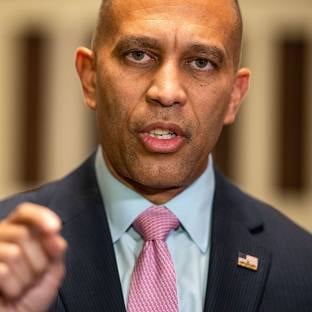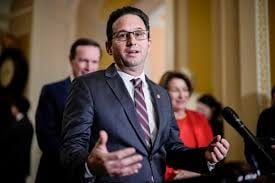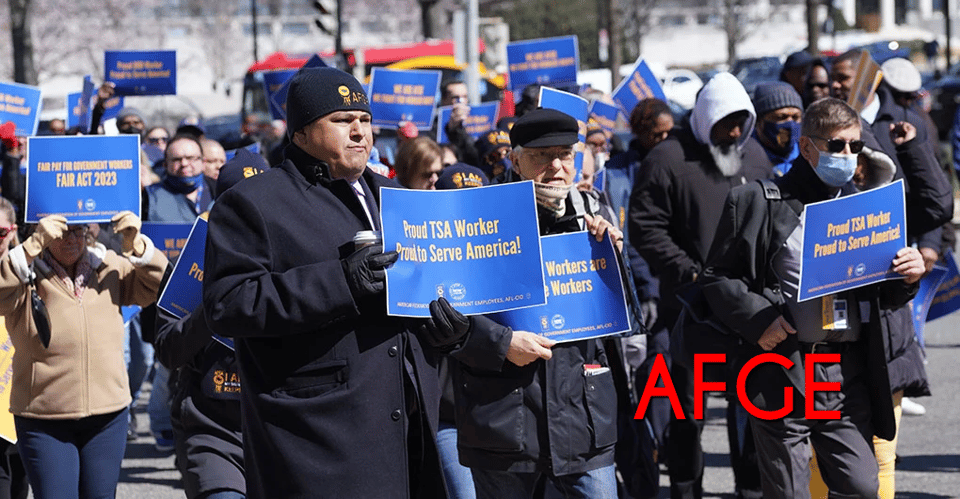Tuesday, February 4, 2025. Annette’s News Roundup.
I am guessing that Trump’s actions of the last two weeks have you as upset as I am.
There are at least 7 ways to stop him:
- Lawsuits.
- Actions by elected officials. Congress. State. City.
- Candid, outraged and truthful Media.
- Labor and laborers.
- Corporate and investor resistance.
- Public outcry. In Person. Online. Letters and Calls.
- Opposition elections.
What the Opposition to Trump is doing right now.
Samples.
Elected officials.
The Democratic Leader of the House sent a letter to his caucus.

Read it. 👇 Then call your Congressional Representative and ask what he or she is planning to do to protect our Democracy this week.
Hakeem Jeffries’ Letter.
This link 👇 will enable you to find the phone numbers for your Rep.
Find Your Representative | house.gov
Democratic Senator Says He Will Stall Trump Nominees Until USAID Is Back.
Schatz’s move would leave several bureaus and offices without senior leadership.

WASHINGTON—Sen. Brian Schatz (D., Hawaii) said he would place a “blanket hold” on all of President Trump’s State Department nominees until the administration’s attack on the leading U.S. foreign-assistance agency ends, a move that threatens to stall Trump’s ability to get his foreign-policy team in place.
Schatz’s threat came as Elon Musk’s Department of Government Efficiency aims to close the U.S. Agency for International Development; the agency’s existence as an independent government organization is codified in federal law. Over the weekend, DOGE staffers forced their way into USAID’s headquarters in Washington, gaining access to classified information and closing the building to employees on Monday.
The Senate typically speeds up the confirmation of many nominees through “unanimous consent,” a process that bypasses a formal vote if no senator objects. By objecting, Schatz’s hold would halt the Senate’s ability to move nominees quickly, requiring Senate Majority Leader John Thune to use precious floor time to advance the president’s picks through the confirmation process.
“I will oppose unanimous consent,” he told The Wall Street Journal. “I will vote no. I will do maximal delays until this is resolved.”
Schatz’s move would leave several bureaus and offices without senior leadership, complicating U.S. diplomatic efforts and the administration’s ability to speak with a clear voice about its foreign priorities.
Representatives for the White House and State Department didn’t immediately return requests for comment.
Holds are a commonly used tactic by lawmakers to secure their policy preferences. During the Biden administration, Sen. Tommy Tuberville (R., Ala.) blocked Defense Department nominees because he opposed the Pentagon paying troops so they could travel for abortion-related services. Sen. Ted Cruz (R., Texas) also slowed down the State confirmation process because former President Joe Biden allowed Germany to complete a pipeline to receive Russian energy.
Schatz’s move shows that Democrats are stepping up their efforts to block DOGE’s attempts to dissolve USAID—and it a signals a greater willingness to push back on the new president. He and other lawmakers in his party will show up at the agency’s Washington headquarters Monday in a show of support.
Democratic senators said they have talked with Republicans in recent days over what actions, if any, they might take to reverse the administration’s actions against USAID. For now, they say there is little they can do legislatively, especially because the organization’s existence already is delineated in federal statute.
Schatz said he expects the judicial system may at least temporarily stop DOGE’s attempts to close USAID. “You cannot wave a wand and eliminate a department established by federal law, so it will be reversed by a court,” Schatz said.
Sen. Chris Van Hollen, (D., Md.) said he was in touch with the group Democracy Forward, a legal nonprofit organization, that would be willing to take up USAID’s cause. The best venue may be filing a lawsuit in Washington, D.C.’s federal court, he said.
On Monday, USAID personnel woke up to an email barring them from showing up for work. The agency’s personnel were instructed to work remotely except for officials with essential functions who have been directly contacted by senior leaders. The email indicates that employees will receive more instructions later. (Wall Street Journal)
Media sample. About the law.
The Law Is Not Fully Trump’s Yet.

Through the sometimes blinding storm of executive orders and memorandums in the opening days of President Trump’s new administration, one pattern is already becoming clear: This is not a crew particularly interested in law.
Within its first nine days, the administration declared it was freezing trillions of dollars in federal grants and loans — a move that at worst violates Article I of the Constitution, which gives Congress the power to decide how taxpayer dollars are spent, and at best violates Article II, which requires the president to ‘faithfully execute” the laws Congress passes.
Mr. Trump fired career officials, flouting laws designed to ensure that government employment is based on merit, not personal loyalty, and then busily began clearing the Department of Justice of career legal staff members so he could replace them with loyalists. And he issued an executive order claiming to eliminate automatic birthright citizenship, in defiance not just of the 14th Amendment but also of the foundational idea that citizens decide who should be a president, not the other way around.
Mr. Trump is hardly the first president to claim broad executive power. The difference this time is not only the enormity of his claims — a level of authoritarian aspiration that far exceeds any other in the modern American age. It’s that the administration hardly even bothers to try to craft legal justifications for its actions.
Many of its orders and memorandums so far are bafflingly vague and internally contradictory, some checkered with embarrassing errors, others largely devoid of references to law. These are not the strategic moves of a legal A team focused on insulating itself against judicial correction, or teeing up a model case to persuade the courts to move the law in a new direction. These seem more like the orders of a team unconcerned with the risks of any legal challenge at all.
Is it true that the law poses no serious obstacle to the ambitions of the new administration’s leaders? Americans’ confidence in the Supreme Court is at a historical polling low, and a large majority say the Supreme Court is more motivated by politics than law. The left, in particular, seems prone to despair about whether the courts will slow our autocratic slide. But that despair is premature. The legal system is not so easily dismissed.
The assumption that the courts will simply capitulate to Mr. Trump is based on some important misunderstandings — starting with the meaning of Trump v. United States, in which the Supreme Court ruled that presidents have substantial immunity from criminal liability for official conduct while in office. As shocking as the decision was, criminal or even civil liability is only one way that our legal system can check executive overreach. Another way — far more relevant here — is by ordering government agencies to take (or stop taking) some action.
That is what a Federal District Court judge, John C. Coughenour, did last week in temporarily blocking Mr. Trump’s birthright citizenship order. That is also what the lawsuits filed in response to the freeze on federal grants seek. The president’s personal immunity from criminal prosecution is irrelevant to these cases.
What’s more, the courts are not so dominated by partisan judges that any action challenging a Republican president will inevitably fail. Between 2017 and 2021, Mr. Trump succeeded in appointing more than 200 judges to the federal bench, and Republican-appointed justices held a majority on the Supreme Court throughout. Yet researchers have since found that the first Trump administration had the worst win-loss record of cases before the Supreme Court compared with any other administration since at least 1937.
In court challenges involving administrative agency disputes, the administration was unsuccessful more than 75 percent of the time, including some of the cases that mattered to Mr. Trump most.
But even that abysmal record understates how often the law functioned to thwart many of Mr. Trump’s most lawless efforts. Lawyers within the government successfully deterred him from some of the worst abuses of power well before the matter got anywhere near a court — including his attempts in his previous term to use the Department of Justice to pursue politically motivated prosecutions.
Of course, Mr. Trump and his people have vowed that will never happen again. That’s why they’re in the process of replacing career lawyers inside the Justice Department with people whose personal loyalty they trust more.
But getting lawyers to back absolutely anything Mr. Trump wants may not be as easy as the president and his advisers think. Politicians can lie all they like, but lawyers are bound by professional rules of ethics. Refusing to follow all of Mr. Trump’s orders could endanger their jobs; following him too blindly, however, may risk endangering their entire careers (as Michael Cohen, Rudy Giuliani and others learned the hard way). That may explain why some of these early orders in the new administration are largely devoid of specific legal guidance — and why they stand a fair chance of being overturned in the courts.
None of this is to suggest that the courts — or the law more broadly — are a singular force that can keep our constitutional democracy from veering into autocracy. Quite the contrary: Mr. Trump will lose some of these cases in the courts, but almost certainly not all of them.
Presidents have enormous power under the law; part of what Mr. Trump is doing is just invoking the breadth of that authority. The deeply conservative supermajority on the Supreme Court will matter in some cases. So, too, will the reaction of the public and Congress if and when the administration moves to defy the courts outright.
But already, the Trump administration has backpedaled on the spending freeze, after less than two days of public outcry and confusion. That’s why it matters that all kinds of forces, from Congress to state legislatures to popular pressure, find the courage to push back against truly lawless executive actions.
For those worried about the fate of our democracy, it would be foolish to rely on the rule of law alone. But it would also be wrong to simply write it off as a meaningless check on presidential authority. That kind of pessimism becomes our self-fulfilling fate. The new president may be aiming for authoritarian control. But the law is not fully his yet. (Deborah Pearlstein is a visiting professor of law and public affairs at Princeton and the director of its Program in Law and Public Policy., New York Times).
Wondering what the Financial Right (not MAGA) thinks of Trump’s First Weeks of Madness?
A hint in Rupert Murdoch’s Wall Street Journal.
Yes, the “pause” happened for Canada as well as Mexico.
Trump Pauses Mexico Tariffs for a Month, but His Threats Spooked Almost Everyone.
Tariffs were the part of Trump’s economic plan investors disliked the most
WASHINGTON—President Trump and Mexican President Claudia Sheinbaum said that they reached an agreement to put tariffs on Mexico on hold for a month, following a telephone call in which both leaders agreed to take joint measures to fight fentanyl trafficking across the U.S. border.
Trump said on his Truth Social platform Monday that his conversation with the Mexican president was a “very friendly conversation,” and she agreed to immediately supply 10,000 Mexican soldiers on the border separating Mexico and the U.S. He added that Secretary of State Marco Rubio, Secretary of Treasury Scott Bessent, and Secretary of Commerce Howard Lutnick would continue negotiations “as we attempt to achieve a ‘deal’ between our two Countries.”
The U.S. agreed to work to prevent the trafficking of high-caliber weapons to Mexico, Sheinbaum said. “Our teams will begin working today on two fronts: security and trade,” Sheinbaum added.
Trump also said that he spoke to Justin Trudeau, Canada’s prime minister, Monday morning and plans to talk to him again at 3 p.m. On Saturday, Trump said the U.S. would impose a 25% levy on imports from Canada and Mexico, a 10% tariff on energy products from Canada, and an additional 10% tariff on China.
Trump’s aggressive move to place tariffs on hundreds of billions of dollars in imports, ranging from crude oil and auto parts from Canada to Mexican avocados and raspberries has rattled investors, economists and some lawmakers, who are all wondering: What exactly is the goal?
Larry Summers, the former U.S. Treasury secretary under President Bill Clinton, said Trump’s move amounted to “a self-inflicted supply shock.” Kentucky Republican Sen. Rand Paul said: “Taxing trade will mean less trade and higher prices.” The head of the National Association of Manufacturers, Jay Timmons, said it put American jobs at risk. “The ripple effects will be severe,” he said.
For many of those reasons, tariffs were the part of Trump’s economic plan investors disliked the most. Markets have cheered Trump’s promises of tax cuts and reduced regulation, but he has vaulted his trade plan ahead of virtually everything else.
Other countries already have moved to retaliate, and Trump acknowledged on Sunday that there could be some “pain” for U.S. consumers.
Canada is planning tariffs on $100 billion of goods, including alcohol, shoes, steel, aluminum and aerospace products. China, which also faces new U.S. tariffs, and Mexico prepared similar counterattacks.
Trump defended his tariffs, saying in an all-caps post: “Will there be some pain? Yes, maybe (and maybe not!)” He added that “it will all be worth the price that must be paid,” and repeated a call to turn Canada into America’s 51st state.
Republicans over the weekend were largely supportive of Trump’s efforts. “We are just two weeks into the Trump administration and Washington does not know what hit it,” said Sen. John Barrasso (R., Wyo.), the No. 2 Senate Republican, on Fox News’s “Sunday Morning Futures.” Asked if he was concerned that the tariffs could undermine the administration’s other policy goals, Barrasso said no.
Rep. Jason Smith (R., Mo.), who chairs the tax-writing House Ways and Means Committee, said the tariffs would bring in billions of dollars in new revenue to the U.S. government.
During his presidential campaign, Trump telegraphed that tariffs would be a key part of his governing strategy, saying repeatedly that “tariff” is his favorite word. Many investors believed that this was part of a negotiating ploy with other countries and that he would try to extract concessions before following through.
So far, Trump hasn’t spent much time negotiating with any other country. His top trade adviser, Howard Lutnick, his nominee for commerce secretary, hasn’t yet been confirmed by the Senate. The confirmation hearing for his pick for trade ambassador, Jamieson Greer, hasn’t occurred yet.
Wall Street analysts and economists are virtually unanimous that tariffs of the sort Trump unveiled this weekend will, if sustained for more than a few months, hurt U.S. growth and boost inflation. After the White House on Friday announced the forthcoming tariffs, stock indexes reversed daily gains to close solidly lower. Monday morning, stocks fell further.
“The market needs to structurally and significantly reprice the trade-war risk premium,” said George Saravelos, head of foreign-exchange research at Deutsche Bank.
A national home-building group said the tariffs threaten to slow residential construction. American fuel producers said it could mean higher gas prices. The generic-drug industry trade association said it could increase drug shortages. Zippy Duvall, president of the American Farm Bureau Federation advocacy group, said U.S. farmers and rural communities would “bear the brunt of retaliation.”
“It was Donald Trump who campaigned on lowering costs, and now it is Donald Trump who will raise them,” said Senate Minority Leader Chuck Schumer (D., N.Y.).
The precise impact will depend on how long the tariffs stay in place and if other countries retaliate. The Tax Policy Center, a think tank, estimates the average household’s after-tax income will fall 1%, or $930, in 2026 because of the tariffs. Goldman Sachs economists estimate the tariffs on Canada and Mexico, if sustained, would raise consumer prices by up to 0.7%, and knock 0.4% off the level of economic output.
In theory, the direct cost to consumers of tariffs could be offset by further tax cuts. But tariffs will have other, less tangible costs such as forcing consumers to alter what they buy because of cost or availability. The Peterson Institute for International Economics estimates tariffs will leave the U.S. economy about 0.25% smaller next year and 0.1% in the long run.
Trump Goes Big With First Tariffs.
Tax-cut talks could begin soon in Congress, though that process is likely to play out over months. Trump wants to extend his expiring tax cuts from 2017 and add new measures such as tax-free tips and tax-free overtime pay. Republicans generally agree on his broader goals. But they are hamstrung by their narrow House majority and mired in internal disputes over how deeply to cut federal spending alongside the tax cuts. They might take the first formal step forward this week, bringing a blueprint to the House budget panel.
Trump’s push to cut government spending already has run into legal challenges and internal missteps. The White House believes high levels of government spending fuel inflation, and last week the Office of Management and Budget tried to put a temporary freeze on a range of government programs.
That initiative sparked confusion and was initially blocked by a federal judge. White House officials will have another opportunity to pursue spending cuts when they negotiate a budget bill with Congress before a March 14 shutdown deadline. However, they will likely need cooperation from Democrats if they want to pass any package in a way that could avoid a government shutdown.
Another key part of Trump’s economic agenda is boosting energy production, which he believes will bring down prices on a range of products and even lower interest rates. So far, there doesn’t appear to be much appetite by other oil-producing countries or energy companies for a dramatic expansion of drilling, however. It is unclear what Trump might try to do to force compliance with this goal.
In 2018, when he launched tariffs aggressively, he said his goal was to bring back American jobs. This time, he seems more focused on the hefty import duties that tariffs could bring in, creating more money for his agenda.
Whether the tariffs could also force changes that Trump has sought remains unclear. Summers, who had correctly warned then-President Joe Biden in 2021 that his stimulus policies would lead to higher inflation, said Sunday on CNN’s “Inside Politics Sunday” that he didn’t think the tariffs would succeed in forcing other countries into accepting meaningful changes in policy.
“Think about what giving in to a bully does. It invites more bullying,” Summers said. (Wall Street Journal).
Labor, lawsuits, and Elected Officials too.
Unions sue to block Musk team’s access to Treasury payments
The complaint accuses the Trump administration of illegally granting Musk team’s access in violation of federal laws.

Federal employee unions on Monday sued to stop Elon Musk’s team from accessing a sensitive government system that controls the flow of trillions of dollars of payments as top Democrats stepped up their attacks on what they said was the billionaire’s “hostile takeover” of the Treasury Department.
The lawsuit, which was filed days after Treasury Secretary Scott Bessent agreed to a plan giving department officials allied with Musk access to the system, landed amid growing pushback to the Tesla founder’s slash and burn efforts to cut hundreds of billions in federal spending.
The Alliance for Retired Americans, along with the American Federation of Government Employees and Service Employees International Union, claim that Musk’s efforts may have illegally exposed the personal data of millions of federal employees — as well as any other individual who does business with the federal government — to unauthorized Department of Government Efficiency personnel.
“The scale of the intrusion into individuals’ privacy is massive and unprecedented,” the groups said in their complaint, which was filed in federal court in the District of Columbia.
The complaint accuses the Trump administration of illegally granting Musk’s team access in violation of federal laws that govern the privacy of agency records and protect the confidentiality of taxpayer information.
“Secretary Bessent’s action granting DOGE-affiliated individuals full, continuous, and ongoing access to that information for an unspecified period of time means that retirees, taxpayers, federal employees, companies, and other individuals from all walks of life have no assurance that their information will receive the protection that federal law affords,” the complaint says. “And because Defendants’ actions and decisions are shrouded in secrecy, individuals will not have even basic information about what personal or financial information that Defendants are sharing with outside parties or how their information is being used.”
Treasury spokespeople did not immediately respond to requests for comment.
Democrats on Monday stepped up their attacks on Musk’s efforts, with Senate Minority Leader Chuck Schumer calling DOGE “an unelected shadow government” that is leading “hostile takeover” of federal agencies.
Schumer and Democratic House Leader Hakeem Jeffries said they were working on legislation aimed at beefing up safeguards to protect the confidential and personal information contained in the Treasury’s payments system. Ways and Means Democrats have launched their own probe into DOGE’s access to the payment rails.
Other Democrats on Monday assailed the Musk team’s access to the Treasury system as unprecedented political meddling into key functions of government that are responsible for doling out benefits to Americans, such as Social Security payments and Medicare benefits.
President Donald Trump earlier on Monday said he supported Musk’s efforts when asked about the billionaire’s DOGE team having access to sensitive Treasury systems.
“Elon can’t do, and won’t do, anything without our approval,” Trump said from the Oval Office. “And we’ll give him the approval where appropriate. Where not appropriate, we won’t.”
“Where we think there’s a conflict or there’s a problem, we won’t let him go near it,” Trump added. Trump said that Musk shared his goal to “shrink government.”
Public Citizen, which is working with the unions on the lawsuit, on Monday hired former Equal Employment Opportunity Commission General Counsel Karla Gilbride — who’d been fired by the Trump administration alongside two Democratic commissioners in a purge of the agency last week.
“The president is not a king, and his power has limits within our Constitutional system of checks and balances — checks and balances that, at Public Citizen, I will fight every day to preserve,” Gilbride said in a press release. (Politico)
Public outcry and elections.
Protests are the voice of the people.
Thousands rally in downtown Los Angeles, shut down 101 Freeway to protest Trump’s immigration policies.
Thousands of demonstrators rallied in downtown Los Angeles on Sunday and shut down a section of the 101 Freeway to protest President Trump’s crackdown on illegal immigration and his aggressive deportation policies.
Draped in Mexican and Salvadoran flags, demonstrators gathered near City Hall shortly before noon, blocking traffic at Spring and Temple streets, amid honking horns and solidarity messages from passing motorists. Protesters blasted a mix of traditional and contemporary Mexican music from a loudspeaker, and some danced in the road in traditional feathered headdresses.
The protests continued into the evening. After a citywide tactical alert was issued around 7 p.m., L.A. police officers were deployed downtown in riot gear, equipped with helmets, batons and less-than-lethal weapons, according to Tony Im, spokesperson for the Los Angeles Police Department.
Near Union Station, officers formed lines to stop the protesters and push them back, he said. As of 10 p.m., there were no reports of arrests or injuries. Police remained at the scene, Im said, as there were “still areas where we are addressing the situation.”
Videos posted on social media after 10 p.m. showed police calling for protesters to disperse.

Demonstrators rally on the Alameda overpass of the 101 Freeway against President Trump’s deportation policies on Sunday.
Trump has declared a crisis at the southern border and released a flurry of executive orders aimed at revamping the country’s immigration system and promising to deport millions of people who are in the country illegally. Protesters told The Times that it was those actions that prompted them to rally downtown.
By 1 p.m., the number of protesters ballooned to several thousand, with some carrying signs that said, “MAGA — Mexicans always get across”; “Don’t bite the hand that feeds you,” referring to the state’s agricultural workers; and “I drink my horchata warm because f— I.C.E.,” a reference to the U.S. Immigration and Customs Enforcement agency.
Nailah Esparza, 18, said that it was her first protest and that she learned about it about a week ago from TikTok videos. She held a sign in Spanish that read, “No more I.C.E. raids, no more fear, we want justice and a better world.”
“It was actually something that was very important, so we decided to show support, because of the youth,” said Esparza, who is Mexican American. “We’re very passionate about what we’re here for.”
Another protester, who identified himself only as Rey out of privacy concerns, brought a sign that read, “Trump eat caca! Beware the Nazis.” He said he protested Trump’s immigration policies during his first term as president.
“We thought we were done with his administration,” said Rey, who is Mexican American. “And now we have to do this again.”
The demonstration was largely peaceful, with some enterprising street vendors taking advantage of the moment to sell bacon-wrapped hot dogs, ice cream, churros, beer and even shots of Patron tequila.
But things appeared to ratchet up when the driver of a silver Mustang began doing doughnuts in a usually busy intersection near City Hall. Soon after, a few police cars arrived as dozens of protesters walked onto the nearby 101 Freeway, while hundreds more crowded overpasses, waving flags and holding signs.
But police — whose presence early in the demonstration was minimal — did not converge on the demonstrators, even as throngs made their way onto the freeway. A section of the freeway near the 110 interchange was shut down around noon and remained closed shortly after 4 p.m., officials said.
Im said on Sunday afternoon that the department was “staffed adequately” to handle the protests but declined to elaborate on staffing details.
A short time after the freeway takeover began, the acrid smell of burning tires hung in the air as trucks and motorcycles did noisy burnouts on an overpass, drawing cheers and cameras amid the noisy din of car horns, police sirens and helicopters overhead.
By 8 p.m., protesters were cleared and the 101 Freeway was reopened, according to the California Highway Patrol.
Promising the largest deportation effort in U.S. history, Trump, in his first days in office, declared a national emergency at the southern border, deploying troops there.
His executive orders sharply limit legal pathways for entering the United States, bolster enforcement efforts to seal off the U.S.-Mexico border, and promote aggressive sweeps to round up and deport people who are not authorized to be in the United States. Some of the orders have been challenged in court, and advocates said others could be soon.
There are an estimated 11 million to 15 million undocumented immigrants in the U.S., including more than 2 million in California.
They include people who crossed the border illegally, people who overstayed their visas and people who have requested asylum. It does not include people who entered the country under various temporary humanitarian programs, or who have obtained temporary protected status, which gives people the right to live and work in the U.S. temporarily because of disasters or strife in their home countries. (Los Angeles Times).
Votes are the voice of the people.
Therefore, elections which Trump people and policies lose should be seen as public’s outcry against Trump.
We must win Elections.
- Good candidates appropriate to the area in which they are running.
- Strong campaigns with winning strategies and messages.
- Volunteers and funds to effect winning strategies and messages.
Here’s the first important candidate of 2025.
Susan Crawford who is running for a judiciary seats on the Wisconsin Supreme Court.

Susan Crawford’s win on April 1st will resonate.
Not only will Crawford defeat a MAGA candidate, blessed by Trump, funded by Musk, but her win will keep the Wisconsin Court in liberal hands, protecting Abortion Rights and stopping Republican gerrymandering.
As we look to 2026, a win by Crawford in Wisconsin will have national implications - the first concrete action by American voters rejecting a dangerous Trump and Republican candidate and agenda.
Make it happen. Help her.
Donate now. Here’s the link
Don’t despair. Do something.